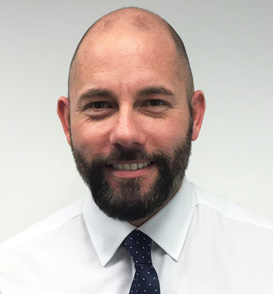While good work is going on, by security officers on the front line, a question is how to make paying customers, and the police, aware of that; and, during a time of service cuts due to the pandemic. These points arose from the latest OSPAs thought leadership webinar chaired by Prof Martin Gill. This afternoon’s was about the role of front-line security staff.
The three panellists were, from Texas, Charles “Chuck” Andrews, recently appointed as Chief Strategic Officer for the industry association IFPO (International Foundation for Protection Officers); and in the UK, Chris Middleton, pictured (courtesy of ABM UK), Security Director at the services contractor ABM UK; and Dr Peter Stiernstedt, who has researched private security and is a lecturer in criminology at the University of West London.
As Chuck said, being a front-line officer is a thankless position. Chris mentioned the counter-terrorism awareness training scheme Griffin, and the CSAS accreditation scheme whereby guard forces (and others) can be trained and badged to have police-like powers, such as to move on trespassers; and hand out ‘ticket’s (fines) to the drunk and disorderly. But as he added, if such guards were to be handing out such penalty notices constantly, those officers might have to spend time in court giving evidence in cases, and clients would not like officers away from the ‘shop floor’.
Martin Gill put the question to the panel of how the security officer’s job has changed for the better. Chuck answered in terms of exposure in the media; that the security officer has a significant role to play, protecting businesses and assets, before law enforcement arrives – if indeed police arrive at all, given the de-funding of law enforcement in some parts of the United States.
Chris added to his earlier point, about Security being ‘client-funded’; that while security people would love to have ‘boots on the ground’, retail service charges and rent does not allow it; meaning that facilities management, cleaning and security may be cut – for example by security officers taking on additional duties as cleaners – not as a ‘bundled’ service, but one person doing two or three roles.
‘How do we respond to that then, Chris?’ Martin Gill asked. Collectively, Chris replied. “We need to be speaking to clients with the same voice – ‘we can’t be making these cuts because there’s huge risk to the reputation of our industry, your business and importantly our people on the ground.'”
But as Martin Gill added, there are not many examples of such coming together, because of sectional interests and commercial competition.
Chuck Andrews spoke of customer service as a good thing, as adding to the role of the security officer, its credibility and delivery, ‘so the client gets return on investment’. He likened it to executive protection of the ‘principal’, whereby besides protecting a client bodily, the officer will pick up bags, and take them to the hotel room; ‘you are going to see more of that’.
Martin Gill pursued that; is customer service something for Security to get excited about, or is something lost? ‘I am a fan of it,’ Chris Middleton said, having come from a customer service background. Chris spoke of the need for Security to show more empathy; ‘if we get that right, it will do wonders’. He contrasted the stand-offish security that (during the covid-19 pandemic) might say ‘can’t you read the sign’ and tell people that if they don’t wear a mask they can’t come in, with winning ‘hearts and minds’ by hearing and empathising that someone has travelled 30 miles to be there and forgot to put a mask in the car. Surely, Martin Gill, the reason for a lack of empathy is that Security is about enforcing rules, and people don’t like that? Chris acknowledged that.
Peter Stiernstedt spoke of how police don’t know enough about what the security industry is about. Martin Gill argued that despite pockets by private security of excellent activity, that’s not the norm; ‘surely the truth of the matter, the reason we are talking about these [issues] is they aren’t the norm, and therein lies the challenge. What is the route to change that?’
Chris Middleton acknowledged that police will support security officers, during an incident – Chris mentioned cases of knife crime; private security would like to do more, to preserve the crime scene, to assist with cordons; ‘that’s something we need to get better at, Martin,’ Chris said – but done as an industry, collectively, not as each ‘siloed’ guarding contract company. With each incident, that’s the end of the collaboration, ‘until the next time’; ‘there’s no follow-up, no lessons learned, no engagement’, he added.
As for the foreseeable future, Peter Stiernstedt spoke of a lack of clear competencies and training that underpin security officers; with those, could be made a stronger case for paying officers more. But you have to connect those competencies to something real; ‘there has to be a regulatory framework’, otherwise it’s vague and subjective.
Chris Middleton spoke of the UK proposed ‘protect duty’ on venues, which may become law arising from the Manchester Arena suicide bomb act of terror; a duty on venue operators which Chris felt was long overdue. That would place a duty ultimately on the client, the venue, and not the guarding contractor.
Next webinars
Tomorrow sees the launch of the next Security Research Initiative (SRI) report – on influences on security as a career choice. On Thursday afternoon, the OSPAs webinars continue, about security recruitment. You can sign up for these free, at https://theospas.com/thought-leadership-webinars/.









